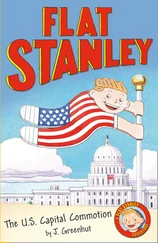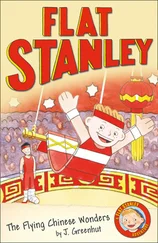Stripping off his shirt and jacket, Tom threaded her arms through the jacket’s sleeves, tucked the dog tags inside and zipped it shut. The best that could be said was that it covered her to the thighs and would be warmer than nothing. His shirt he used as a makeshift skirt, tying it round her waist under the jacket.
It felt like he was dressing a small child.
Tom tucked the photographs under his belt, folded his lock knife and slipped it into his jeans pocket. When he looked back, Alex was staring up at him.
‘Who?’ she asked.
‘Tom,’ he said. ‘We met at your stepfather’s party.’
The girl’s eyes focused on the changing room behind him and widened in shock, her question forgotten, his answer unheard. Tears rolled down her face. ‘You’re not meant to move me. He’s going to be so cross.’
‘We’ll be gone before he’s back.’
She tried to shake her head, then she shut her eyes and her head slumped as she slipped to the edge of sleep or unconsciousness.
‘Don’t,’ Tom said. ‘Stay with me.’
A moment later, Alex whispered, ‘He’ll catch us.’ Her chin trembled. ‘You could say you didn’t understand his orders. He might believe that. You made a mistake. You’re sorry…’
‘Alex, I’m going to get you out of here.’
Her mouth twisted in misery. ‘You don’t know him,’ she said.
His father had been a tsarist officer.
Not Kyukov, General Dennisov.
Tom had been told that or read it somewhere.
Criminals, recidivists, tsarists, Jews, separatists, the gulags were at their height in the thirties, filled according to Stalin’s whim or paranoia. Kyukov and Dennisov had made it out of here as children.
This was a man who had survived Stalin by feeding his superiors to the machine.
To do that you had to know where the machine’s hungers lay, what its weaknesses were… The commissar’s entire cadre were compromised in one go by the photographs of the baby-faced officer lashed to a chair. All those threads tying the USSR’s future leaders into one sticky web…
Careful planning or lucky accident?
Either way, the man was unstable, unstable as sweating gelignite with a faulty fuse.
Tom should have felt right at home.
Stepping up on to the double-sided bench running down the middle of the changing room, he clambered on to the bar from which clothes had once hung, balanced there precariously and grabbed for the skylight before he could fall. The window frame was so rotten its lock simply ripped away.
Now he just had to get Alex up there.
‘I can’t,’ she said.
‘You can,’ Tom promised her.
‘You’re just making things worse.’
She was cross. Cross was good. Cross showed Alex was still in there.
When cajoling and encouragement failed, Tom fell back on cruelty.
Threatened with being hauled up by a rope, the girl let herself be balanced on the bench, boosted up to the rail and held upright until she found the edge of the skylight. ‘Up you go,’ Tom said.
He gripped her ankles, intending to lift her, but let go when he heard her whimper and felt blood on his hands from where Kyukov’s rope had lacerated her. He thought for an instant that she was going to crumple, and he knew he wouldn’t be able to catch her properly if she fell.
‘Hold on,’ he said.
‘I’m trying,’ Alex said.
‘I’ll make a stirrup with my hands.’
Shakily she raised one foot for the stirrup and Tom boosted her up, watching her foreshorten and vanish.
‘Alex?’
He needed an answer.
All he got was silence. And then she was staring down, her eyes wide. The wind had roused her and she was hugging herself with one hand, holding the edge of the skylight with the other, and shivering.
‘There’s a Jeep.’ She sounded scared.
‘I’m on my way…’
51
Not One Step Back, Stalingrad, Winter 1942
‘I volunteer, Comrade Commissar. Let me prove my loyalty.’
The haggard major stared at the boy who’d stepped forward. Before he could speak, the boy grabbed the wrist of a grinning Tartar a few years older.
‘He volunteers too.’
His friend looked so surprised that the first boy gripped his shoulders, hugging him tightly and whispering what the major imagined was encouragement. Had Major Milov known the truth, he’d have been less moved.
‘We can always desert.’
When the school’s commander stepped forward, the major cut him off with a glare, staring out over the assembled boys. They stank of dirt and shit and too few showers, but no worse than those he’d left behind him.
‘How old are you?’
‘Eighteen,’ said the boy. It was an obvious lie.
The Tartar might be eighteen. Just. The major found Asiatic faces difficult to judge, and the loyalty of their owners. But the smaller boy, the sharp-faced one – he was younger.
‘Their crimes?’
‘This one, thieving, delinquency, slander, rape. That one…’ The school’s commander nodded at Pyotr Dennisov. ‘From a family of traitors.’
‘Kulaks?’
‘Worse. White Army officers.’
‘Parents dead?’
‘Father executed. No idea about his mother.’
The camp where Pyotr Dennisov had spent most of his short life was a maloletki , reserved for the children of traitors, renegades and recidivists. A few miles further into the forest was a ChSIR , which held wives of traitors to the Motherland. Part of a grouping outside Stalingrad, both supplied labour for the logging industry.
If his mother was still alive, Pyotr hadn’t heard from her.
The prisons in the city had already been emptied, their inhabitants thrown into the front line. The Soviet Army in Stalingrad was out-machined and outnumbered by experienced enemy officers and professional soldiers. But what the USSR did have was a near-bottomless well from which to draw conscripts.
‘What are you volunteering for?’
‘To fight. To die.’
The commissar was surprised that the penal school hadn’t been emptied before this. He’d have taken the lot of them by now. He was, however, puzzled by a boy who would volunteer rather than plead youth, or keep his head down and hope like the rest of his school. ‘Your name?’
‘Dennisov, Comrade Major. Pyotr Dennisov. This is Kyukov.’
‘He doesn’t speak for himself?’
‘His Russian is not good.’
‘You speak Turkic?’
‘A little, Comrade Major.’
You didn’t have to speak Russian to die. You didn’t have to speak at all. You simply had to charge the guns, probably unarmed, wait until the man in front fell, pick up his rifle if he had one and keep going.
‘Over there,’ he told them.
The two boys went to stand behind the major as he turned to address the rest. He imagined by now that they had guessed what he intended to say.
Later, the words became so famous they were used in a poem by Yevtushenko, unless it was by Voznesensky. Back then, it was just a standing order: When the man in front dies, the man behind takes his place…
It was shouted so loudly and so often that by the time Pyotr reached the front of the queue he’d heard it a hundred times.
‘Here…’
A corporal thrust a loaded rifle at him and gave a clip containing another five bullets to Kyukov behind. Kyukov’s mouth twisted in displeasure at not getting his own gun.
‘You’ll get one soon enough,’ Pyotr promised, as another corporal shoved them away from the head of the line. ‘Not mine, though…’
‘Thought we were going to desert?’
‘See anywhere to run to? Anywhere to hide?’
The weight of the other conscripts, shoves from corporals and brave words from red-capped political officers – shouted through megaphones – carried the lot of them to the ruined edge of a railway siding. Falling snow made it impossible to see the far side and a whining wind howled through what remained of an engine shed.
Читать дальше
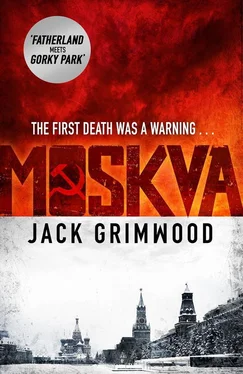

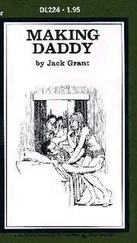



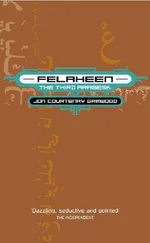


![Георгий Турьянский - MOSKVA–ФРАНКФУРТ–MOSKVA [Сборник рассказов 1996–2011]](/books/422895/georgij-turyanskij-moskva-frankfurt-moskva-sborni-thumb.webp)
